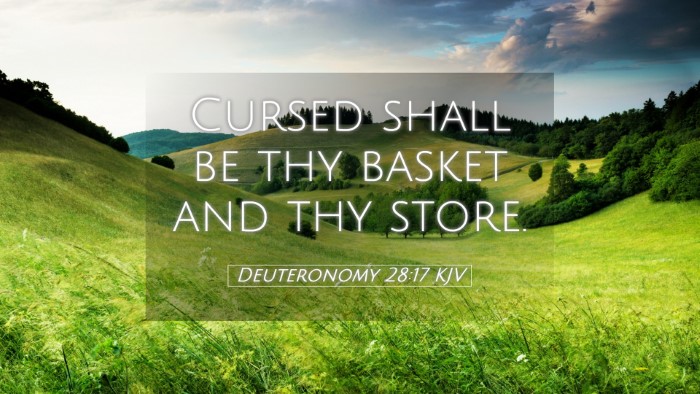Commentary on Deuteronomy 28:17
Verse: "Cursed shall be your basket and your kneading bowl."
Introduction
Deuteronomy 28 is a pivotal chapter in the context of covenant blessings and curses. This chapter outlines the consequences of obedience and disobedience to God's commands. The verse in question, Deuteronomy 28:17, specifically addresses the curses that would befall Israel if they turned away from the Lord. It serves as a profound reminder of the importance of faithfulness to God's statutes and the dire consequences of unfaithfulness.
Contextual Understanding
The book of Deuteronomy is fundamentally a restatement of the law given to the Israelites as they prepared to enter the Promised Land. Moses, the principal speaker, outlines both blessings for obedience (Deuteronomy 28:1-14) and curses for disobedience (Deuteronomy 28:15-68). The mention of the "basket" and "kneading bowl" in verse 17 symbolizes the staple of life: food production and provision. Without divine blessing, these essential elements of sustenance become symbols of failure and despair.
Commentary Analysis
Matthew Henry's Perspective
Matthew Henry emphasizes the significance of the basket and kneading bowl as integral to daily life. They represent the completion of the essential tasks of gathering and preparing food. Henry notes that the curse implies a frustration of these tasks; what should provide nourishment would instead bring disappointment. He poignantly points out that even the most fundamental means of sustenance would be cursed if the people turned away from God. This highlights a powerful theological truth: when one is disconnected from God, even basic provisions become problematic.
Albert Barnes' Analysis
Albert Barnes interprets this verse as emphasizing the spiritual and material consequences of disobedience. He notes that God's blessings are closely tied to the Israelites' faithfulness. In Barnes’ view, the basket and kneading bowl signify not just physical nourishment but also the spiritual sustenance that comes from God’s favor. He draws a parallel to the idea that when one is under God's curse, their attempts at fulfillment—especially in the most mundane aspects of life—will be met with failure. Barnes further references the societal implications of such curses, where community and family stability would also be adversely affected.
Adam Clarke's Insights
Adam Clarke brings a nuanced interpretation to this passage, focusing on the Hebrew words used. Clarke explains that the "basket" (סְלִי, sēlî) denotes a vessel for carrying grain, while the "kneading bowl" (עִסּוּר, ʿissûr) refers to the dish used for mixing dough. He points out that these are indeed symbols of fertility and productivity. Clarke posits that the curse signifies a withholding of agricultural productivity and prosperity, suggesting that God’s blessings are essential for the fruitfulness of the land. He warns that the covenant relationship requires a continual adherence to the commandments, as straying from God’s ways results in significant personal and communal breakdown.
Theological Implications
- Covenantal Relationship: The verse underscores the necessity of maintaining a relationship with God through obedience. This foundational aspect of covenant theology can be extrapolated to the New Testament, where the fulfillment of the law and the blessings inherent in Christ serve as a reminder of God’s faithfulness.
- Consequences of Disobedience: Each curse serves as a warning not only to Israel but to all believers today. The emphasis on mundane aspects of life such as food production illustrates that no area of life is exempt from God’s overarching sovereignty.
- Divine Provision vs. Human Effort: The curse on the basket and kneading bowl symbolizes the futility of human effort without divine assistance. Believers are called to recognize that true prosperity and fulfillment rely on God's blessing rather than mere effort or works.
Practical Application
This verse serves as a somber reminder for modern readers about the holistic nature of God’s blessings in their lives. Pastors, students, theologians, and Bible scholars can draw lessons from this passage that resonate beyond mere agricultural concerns into the realms of spiritual and relational faithfulness.
- Faithfulness in Daily Life: Consistent devotion to God in everyday activities encourages the faithful application of biblical principles, fostering an environment where divine blessings can flourish.
- Community Responsibility: Understanding the corporate nature of blessings and curses can encourage individuals to take responsible action within their communities, promoting a collective adherence to God's principles.
- Spiritual Discernment: Recognizing the subtle shifts in life that might indicate a departure from God's ways can enhance one’s spiritual vigilance and accountability to God’s word.
Conclusion
Deuteronomy 28:17 encapsulates profound truths regarding the outcomes of our relationship with God as expressed through obedience or disobedience. Through the insights gathered from Matthew Henry, Albert Barnes, and Adam Clarke, we appreciate the significance of the mundane aspects of life as reflections of our spiritual state. The themes of covenant faithfulness, the reality of consequences, and the essential nature of divine provision echo throughout Scripture and are crucial for a robust understanding of biblical theology. May this passage remind us to seek God earnestly in all aspects of our lives, understanding that His blessings are not only desired but also essential for true prosperity.


